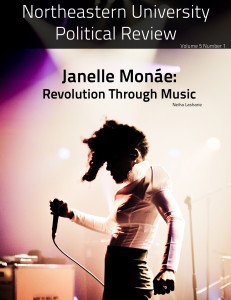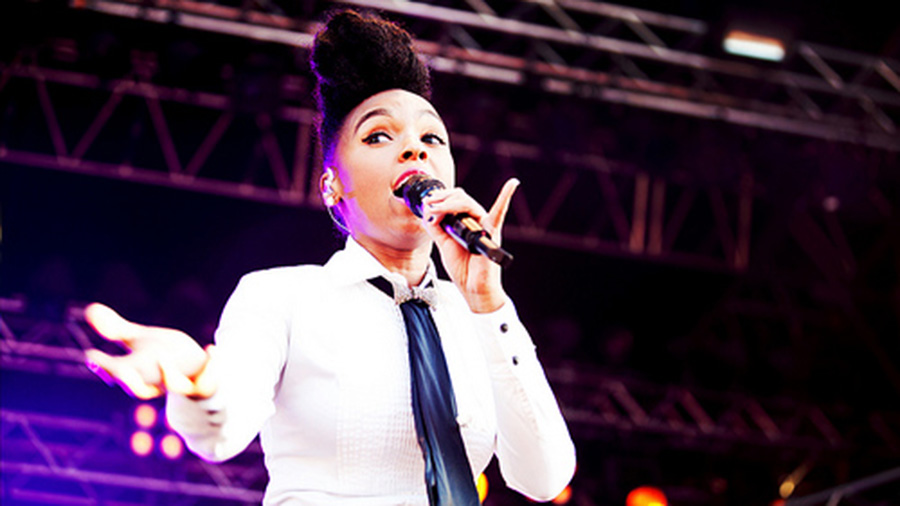 I recall casually browsing Tumblr one day and coming upon a picture of an extremely pretty black woman, button-nosed and petite, with the most fabulously coiffed pompadour afro, rocking a sharp tux and sharper cheekbones.
I recall casually browsing Tumblr one day and coming upon a picture of an extremely pretty black woman, button-nosed and petite, with the most fabulously coiffed pompadour afro, rocking a sharp tux and sharper cheekbones.
My interest was instantly piqued, but I never really listened to her music until someone uploaded an Mp3 track from her first concept album, titled Sincerely, Jane. I was instantly taken by her smooth voice, the orchestral quality of the music, the dramatic strings and brass instruments, and – goodness – those lyrics. Immediately, I went and got the entirety of her second concept album, The ArchAndroid. It was a masterpiece, a multi-faceted piece of art that transcended music in its narrative, composition and wider themes, and each one of her albums reflects the same quality.
The first thing I noted was Monáe’s amazing storytelling ability. When I say albums, what I really mean is an entire universe constructed through music. She tells the story of her alter ego, an android named Cindi Mayweather from the year 2719 who commits the crime of falling in love with Anthony Greendown, a human. On the run, Mayweather is hailed as a messiah, the ArchAndroid. She is sent back in time to her hometown of Metropolis to free the people from tyranny at the hands of an organization called “The Great Divide.” Its goal is to oppress and suppress freedom and love using time travel.
At first glance, the sci-fi elements may be overwhelming, or even off-putting, but the greater themes of Monáe’s work cannot be undermined. The issues she addresses are very much present in our world today, where people are “othered” and their very existences suppressed because of their minority status. Cindi, the Android is used as a mouthpiece for minorities, while at the same time she is the key player in her own story, instead of an understudy in someone else’s. In an interview with the London Evening Standard, Monáe says, “I speak about androids because I think the android represents the new ‘other’.[1]You can compare it to being a lesbian or being a gay man or being a black woman … What I want is for people who feel oppressed or feel like the ‘other’ to connect with the music and to feel like, ‘She represents who I am.’”
Her albums must be listened to in chronological order so the listener can truly appreciate her mastery of the craft of weaving a tale. One would begin with Metropolis The Chase Suite, and then proceed to ArchAndroid, which consists of Suite II and III in the seven-suite Metropolis concept series. It also serves as the prequel to The Electric Lady, her latest album, which itself represents Suite IV and V. While Metropolis The Chase Suite consists of only five tracks, with some released later, ArchAndroid is an 18-track masterpiece, piecing together elements of R’n’B, old-school pop, rock, and punk. The diversity in genres is coupled with incredible production and collaboration, and there are some spectacular throwbacks to legendary artists such as Michael Jackson, Simon and Garfunkel, Alicia Keys and even Outkast. In fact, Big Boi from Outkast can be credited with discovering Monáe in the first place.
As previously mentioned, her work and her image have symbolic meaning. What Monae represents and spearheads is Afrofuturism: a literary and cultural movement that usurps mainstream cultural aesthetics and injects it with Afrocentric history, literature, and magical realism. [2] It addresses the dilemmas of people of different cultures, while at the same time it creates a framework through which to view the past and project the future. Monáe is incredibly important for furthering that framework. Her work is the perfect combination of science fiction, social anthropology, and media. As a woman of color, I cannot stress the importance of this narrative. It celebrates the nuanced experiences of people of color and minorities through a medium that can be appreciated by all: music. A quick Google search of Afrofuturism puts Monáe’s album art for ArchAndroid as the first image hit. If that isn’t Internet validation, little else is.
The Electric Lady was released on September 6th 2013, to mass critical acclaim, and it features collaborations with artists such as Prince, Miguel, Erykah Badu, Solange Knowles, and Esperanza Spalding; ,and what an incredible album it is. Laced with interludes of a radio show from Metropolis, every song is a blockbuster that will have you wanting to dance in no time, from the incredibly romantic Primetime (ft. Miguel), to the empowering and simultaneously heart-wrenching Q.U.E.E.N. (ft. Erykah Badu). The Electric Lady commands the undivided attention of listeners from start to finish and forces them to accept the freedom that is love. In a world as cynical and dark as our world is today, it is no wonder that Monáe is being hailed as the voice of a generation. Cindi Mayweather, the ArchAndroid, breaks the shackles of oppression with love, peace, music, and dance, and in none of her tracks is this more evident than in the first single from The Electric Lady, Q.U.E.E.N.
Much of the lyrics in Q.U.E.E.N are derived from Monáe’s own experiences, but it is an experience that all women, especially women of color, can relate to. She speaks of the judgment that all women are subjected to; the fine line between “slut” and “prude” that women must learn to navigate, singing, “Am I a sinner with my skirt on the ground?”
She addresses the struggles of being a minority, the pressure of being a “credit to one’s race” and how one must reclaim stereotypes in order to shatter them. “They be like ooh, let them eat cake//But we eat wings and throw them bones on the ground.” The reference to the popular misquotation from Marie-Antoinette fits within the modern dilemma of social inequity. She even addresses how religion cannot be the lens through which people are viewed and degraded.. This is another throwback to her interview; how the android represents the “other” in society. She forces the listener to consider this with the lyrics, “Hey sister am I good enough for your heaven?//Say will your God accept me in my black and white?//Will he approve the way I’m made?//Or should I reprogram, deprogram and get down?”
She compels the listener to be cognizant of the above, and be accepting of the nuances in society. Her words inspire the listener to truly embrace the fact of being an “Electric Lady,” powerful and strong, self-sufficient and sensitive, to “shock and shake it, baby,” a line often repeated throughout the Electric Lady album. She refuses to shy away from themes of institutionalized racism and misogyny, and redirects R’n’B, rap, and jazz to get her message across – genres traditionally stemming from and associated with African-Americans.
All the above comments and feelings and connection are my reason for believing that Monáe is the voice of our generation: fearless, unapologetic, a messenger of love and equality. She combines the universality of music and the undeniable sway of rhythm that starts a movement, a subculture that picks up momentum from the timelessness of her work and the energy of her live performances. Her public image defies all stereotypes in style, championing the androgynous nature of the suit and tie. She is intelligent, powerful, and a role model for all women and people of color. The only real way to end this article and do any justice to Janelle Monáe is to borrow from her own lyrics. The impassioned rap at the end of Q.U.E.E.N. is the linchpin of the song; empowerment manifesting itself in rhyme.
“Are we a lost generation of our people?
Add us to equations but they’ll never make us equal
She who writes the movie owns the script and the sequel
So why ain’t the stealing of my rights made illegal?
[…]
March to the streets ’cause I’m willing and I’m able
Categorize me, I defy every label
And while you’re selling dope, we’re gonna keep selling hope
We rising up now, you gotta deal you gotta cope
Will you be electric sheep?
Electric ladies, will you sleep?
Or will you preach?”
Neiha Lasharie
Political Science & International Affairs, ’18
Sources:
1. http://www.standard.co.uk/lifestyle/rnb-sensation-janelle-mone-is-here-because-we-need-her-6418158.html
2. http://www.ebony.com/entertainment-culture/black-alt-enter-afrofuturism-999#axzz2jyeT0KMK



